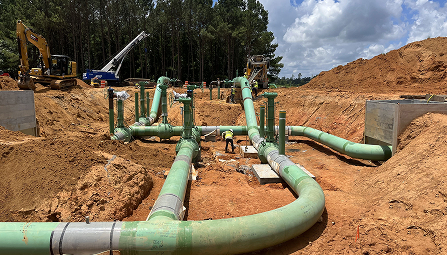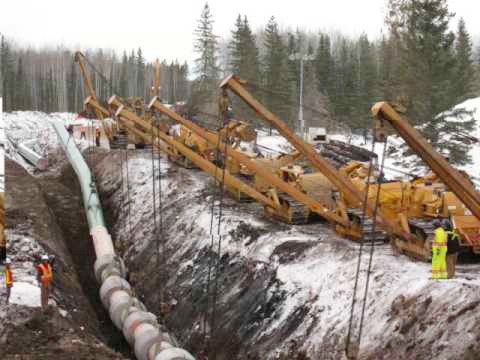Pipeline Construction Services and Environmental Compliance: A Complete Overview
The Necessary Overview to Comprehending Pipeline Construction Solutions and Their Significance
Pipeline Construction services are fundamental to the transportation of necessary sources such as oil, water, and gas. These solutions entail careful planning and implementation, sticking to rigid security and environmental standards. As the sector adapts to modern obstacles, comprehending its elements and effects comes to be significantly crucial. What factors add to the expanding importance of these services in today's economic situation? The complying with sections will explore these essential elements.
Overview of Pipeline Construction Solutions
Pipeline Construction services incorporate a series of tasks vital for the installation and upkeep of pipelines made use of to move different compounds, including oil, water, and gas. These solutions are essential for guaranteeing the effective and secure movement of resources from one area to an additional. The process usually starts with comprehensive preparation and layout, which takes into account regulatory demands, ecological factors to consider, and logistical challenges.
Excavation and grading of the land are performed to prepare the site for Pipeline setup as soon as planning is total. This is adhered to by the actual laying of the pipes, which includes welding or signing up with sections together to develop a constant flow path. After installment, extensive screening is executed to assure integrity and safety and security. Upkeep services are additionally supplied to attend to any kind of concerns that may emerge with time. Overall, Pipeline Construction services play a critical function in sustaining framework for power and water circulation.
Trick Parts of Pipeline Construction
An effective Pipeline Construction job relies upon a number of essential components that guarantee the risk-free and effective installation of the Pipeline system. First, comprehensive website analyses are vital, as they determine the geographical and environmental factors that might influence Construction. Next, the selection of ideal materials, such as fittings and pipes, is crucial for safeguarding toughness and compatibility with the delivered compounds.
Moreover, progressed Construction techniques, consisting of trenchless innovation and directional boring, boost effectiveness and reduce ecological effect. Effective job management is an additional vital component, collaborating labor, equipment, and timelines to satisfy task goals.
Furthermore, interaction among stakeholders, consisting of engineers, specialists, and local authorities, assurances placement on project requirements and demands. Finally, complete quality control procedures throughout the Construction procedure ensure compliance with sector standards and maximize the Pipeline's operational life-span. Jointly, these components develop the foundation of a successful Pipeline Construction task.
Security Specifications and Regulations in Pipeline Construction

Governing bodies, such as the Occupational Security and Health And Wellness Management (OSHA) and the Pipeline and Hazardous Materials Security Management (PHMSA), stated specific demands that govern Construction methods. These include procedures for tools use, worker training, and emergency situation feedback treatments. By implementing these standards, Construction business not only secure their staff members yet additionally safe public depend on. Eventually, extensive security procedures add to the long-lasting success of Pipeline jobs, guaranteeing they fulfill both functional and environmental assumptions.
Environmental Considerations in Pipeline Projects

Environmental factors to consider are important to the planning and execution of Pipeline projects. These tasks need to examine prospective influence on environments, water resources, and local wildlife. Conducting detailed environmental influence evaluations (EIAs) is vital, permitting stakeholders to identify and alleviate risks prior to Construction begins.
Shielding sensitive locations, such as wetlands and environments, commonly requires applying particular layout features or different directing to decrease disturbance. Furthermore, Pipeline drivers are tasked with establishing strategies for preventing leakages and spills, which can have terrible results on the environment.
Interaction with regional areas is necessary, as public concerns can cause task modifications that improve environmental management. Conformity with regulations established by environmental companies guarantees that tasks meet sustainability standards, fostering a balance between facilities requirements and eco-friendly conservation. Ultimately, dealing with environmental considerations not only safeguards nature however likewise promotes neighborhood depend on and job feasibility.
The Duty of Technology in Pipeline Construction
Technology plays an important role in contemporary Pipeline Construction, enhancing efficiency and accuracy. Advanced surveying techniques enable specific preparation and implementation, lessening ecological influence and task hold-ups. In addition, the combination of automation and robotics simplifies procedures, minimizing labor expenses and enhancing security on Construction sites.
Advanced Surveying Strategies
Advanced evaluating methods play a necessary duty in the successful implementation of Pipeline Construction tasks. These techniques leverage innovative modern technology to assure exact mapping and analysis of the surface where pipes will be mounted. Methods such as Geographic Info Systems (GIS), LiDAR (Light Discovery and Ranging), and 3D modeling allow engineers to examine the landscape and imagine, identifying possible challenges and environmental issues. By making use of these advanced devices, teams can boost accuracy in placing and alignment, greatly lowering the danger of mistakes during Construction. In addition, real-time data collection enables prompt modifications and educated decision-making throughout the project lifecycle. Inevitably, these surveying technologies add to boosted performance, safety and security, and sustainability in Pipeline Construction efforts.
Automation and Robotics

Economic Influence of Pipeline Infrastructure
Pipeline framework plays a vital duty in facilitating and shaping local economies trade. By supplying a dependable ways of moving oil, gas, and other products, pipes lower transportation prices and enhance supply chain efficiency. This facilities brings in investment, promotes work creation, and cultivates economic development in bordering areas.
Moreover, the Construction and upkeep of pipes contribute substantially to regional economies, developing numerous employment possibility in different fields, from design to labor. The influx of tasks often results in raised spending in neighborhood companies, additionally strengthening economic task.
Additionally, pipes boost energy security by ensuring a stable supply of resources, which is crucial for property requirements and industrial operations. As regions become interconnected with Pipeline networks, they get to wider markets, boosting competition and financial strength. Subsequently, the economic impact of Pipeline facilities is diverse, influencing both prompt neighborhood economies and broader local development.
Future Patterns in Pipeline Construction Services
The future of Pipeline Construction solutions is developing in response to technical advancements, governing modifications, and expanding environmental factors to consider. Advancements such as drones and robotics are enhancing inspection and upkeep processes, improving safety and effectiveness. Automation is positioned to minimize labor costs and raise precision in Construction procedures. In addition, the enhancing focus on sustainability is prompting firms to adopt green materials and techniques, lining up with worldwide efforts to decrease carbon impacts.
Regulatory frameworks are additionally adapting to deal with ecological impacts, pressing for greater transparency and liability in Pipeline projects. Moreover, the integration of wise modern technologies, including real-time tracking systems, is anticipated to improve the reliability and efficiency of Pipeline networks. As power needs change toward renewable sources, Pipeline Construction services will likely see an increase in tasks related to biofuels and hydrogen transportation. Overall, these trends suggest a transformative period for the Pipeline Construction sector, concentrated on innovation and sustainability.
Frequently Asked Questions
What Sorts of Pipelines Are Typically Created?
Numerous kinds of pipes are commonly constructed, including oil, sewage, gas, and water pipes - Pipeline Construction Services. Each serves distinct purposes, assisting in the transportation of vital sources across regions while adhering to safety and ecological laws
Just how Lengthy Does a Normal Pipeline Job Take?
The duration of a typical Pipeline project differs substantially, commonly varying from a number of months to a few years. Factors affecting this look what i found timeline consist of job complexity, regulatory authorizations, and environmental considerations that must be resolved.
That Controls Pipeline Construction Companies?
Pipeline Construction companies are managed by numerous government, state, and regional companies, including the Pipeline and Hazardous Products Safety And Security Management (PHMSA) and state utility payments, making sure compliance with safety and ecological standards throughout the Construction process.
What Are Common Products Used in Pipeline Construction?
Usual materials made use of in Pipeline Construction include steel, polyethylene, and PVC. Each product uses distinct benefits such as toughness, versatility, and resistance to rust, making them ideal for various applications in carrying gases and fluids.

Just How Are Pipeline Construction Expenses Estimated?
Pipeline Construction costs are approximated by assessing webpage aspects such as material expenses, labor rates, task intricacy, environmental considerations, and regulatory needs (Pipeline Construction Services). Exact price estimate warranties efficient budgeting and job planning throughout the Construction procedure
Pipeline Construction services encompass an array of activities vital for the installation and upkeep of pipes utilized to carry various materials, consisting of oil, gas, and water. An effective Pipeline Construction task depends on several key components that assure the reliable and safe setup of the Pipeline system. Advanced evaluating methods play an important role in the effective execution of Pipeline Construction tasks. Various kinds of pipes are typically created, including oil, gas, water, and sewer pipelines. Pipeline Construction expenses are approximated by evaluating variables such as product expenditures, labor rates, job intricacy, ecological considerations, and governing needs.